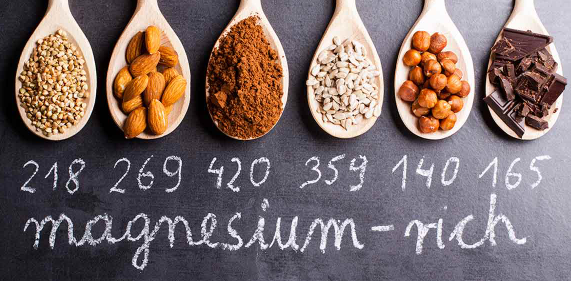BOURSESSENEGAL – When it comes to essential nutrients, magnesium often takes a backseat. However, incorporating magnesium-rich foods into your diet can significantly enhance your overall health. This comprehensive guide will explore the importance of magnesium, its benefits, and how to effortlessly include magnesium-rich foods in your daily meals.
What is Magnesium and Why is It Important?
Magnesium is a vital mineral that plays a key role in over 300 biochemical reactions in the body. It helps maintain normal muscle and nerve function, supports a healthy immune system, and regulates blood sugar levels. Moreover, magnesium is essential for protein synthesis and bone health.
Health Benefits of Magnesium
Supports Muscle Function
Magnesium aids in muscle contraction and relaxation. A sufficient intake can prevent cramps and spasms, making it especially important for athletes or anyone with an active lifestyle.
Enhances Energy Production
This mineral plays a crucial role in converting food into energy. Low magnesium levels can lead to fatigue and decreased performance, impacting daily activities.
Promotes Heart Health
Studies show that magnesium contributes to maintaining normal heart rhythms. It can help lower blood pressure and reduce the risk of heart disease.
Aids in Mental Health
Research suggests that magnesium can alleviate symptoms of anxiety and depression. It helps regulate neurotransmitters, which are crucial for mood stabilization.
Identifying Magnesium-Rich Foods
Incorporating magnesium-rich foods into your diet is easier than you think. Here’s a breakdown of the best sources.
Leafy Greens: A Nutrient Powerhouse
Leafy greens like spinach, kale, and Swiss chard are packed with magnesium.
- Spinach: Just one cup of cooked spinach contains about 157 mg of magnesium.
- Kale: This superfood also offers a healthy dose of magnesium along with vitamins A, C, and K.
Nuts and Seeds: Small But Mighty
Nuts and seeds are excellent sources of magnesium.
- Almonds: A one-ounce serving provides around 76 mg.
- Pumpkin Seeds: These seeds offer about 150 mg per ounce, making them a fantastic snack option.
Whole Grains: Choose Wisely
Opting for whole grains instead of refined grains can significantly increase your magnesium intake.
- Quinoa: A cup of cooked quinoa contains approximately 118 mg of magnesium.
- Brown Rice: One cup of cooked brown rice provides about 86 mg, making it a staple in magnesium-rich diets.
Legumes: The Unsung Heroes
Beans and lentils are not just high in fiber; they’re also great sources of magnesium.
- Black Beans: One cup of cooked black beans delivers about 60 mg of magnesium.
- Chickpeas: These offer around 80 mg per cup and are incredibly versatile for various dishes.
Fish: A Delicious Source
Fatty fish like salmon and mackerel not only provide omega-3 fatty acids but are also rich in magnesium.
- Salmon: A serving of cooked salmon has approximately 26 mg of magnesium.
- Mackerel: This oily fish contains about 97 mg per serving.
Creative Ways to Add Magnesium-Rich Foods to Your Diet
Incorporating magnesium-rich foods doesn’t have to be boring. Here are some ideas to make your meals both nutritious and enjoyable.
Breakfast Boosts
Start your day with a magnesium-rich breakfast. Try oatmeal topped with almonds and a sprinkle of pumpkin seeds. This combination not only tastes great but also fuels your body for the day ahead.
Wholesome Lunch Options
For lunch, consider a quinoa salad loaded with spinach, chickpeas, and a drizzle of olive oil. This meal is not only satisfying but also packed with nutrients.
Nutritious Snacks
Snack smart by munching on a handful of nuts or seeds. Almonds and pumpkin seeds make excellent choices that keep your energy levels steady.
Dinner Delights
Incorporate fish into your dinner routine. A grilled salmon fillet served with steamed broccoli and brown rice creates a balanced meal rich in magnesium and other essential nutrients.
Recognizing Magnesium Deficiency
Despite its importance, many people do not get enough magnesium. Signs of deficiency can include:
- Muscle cramps
- Fatigue
- Nausea
- Abnormal heart rhythms
If you suspect a deficiency, consult a healthcare provider for guidance.
Who is at Risk?
Certain groups are more likely to experience magnesium deficiency. These include:
- Individuals with gastrointestinal diseases
- Older adults
- People with type 2 diabetes
- Those with a high intake of processed foods
Supplements: Are They Necessary?
While it’s best to obtain magnesium from food sources, some people may consider supplements. If you’re thinking about taking a magnesium supplement, consult a healthcare professional first. They can help determine the appropriate dosage and ensure it won’t interact with any medications you may be taking.
Tips for Increasing Magnesium Intake
Meal Planning
Plan your meals around magnesium-rich foods. Incorporate a variety of these foods throughout the week to ensure adequate intake.
Read Nutrition Labels
When shopping, pay attention to nutrition labels. Look for products that highlight their magnesium content, especially when it comes to cereals and snack foods.
Cook at Home
Cooking at home allows you to control your ingredients. Experiment with recipes that feature whole grains, legumes, and leafy greens.
Stay Informed
Educate yourself about the foods you eat. Understanding which foods are high in magnesium can help you make better choices.
Conclusion
Incorporating magnesium-rich foods into your diet is a simple yet effective way to boost your overall health. From leafy greens and nuts to whole grains and fish, there are countless delicious options available. By understanding the importance of magnesium and actively seeking out these foods, you can support your body in numerous ways.
Take the first step today. Start adding magnesium-rich foods to your meals, and experience the benefits for yourself. Your body will thank you!
REFERENCE : https://www.health.com/



